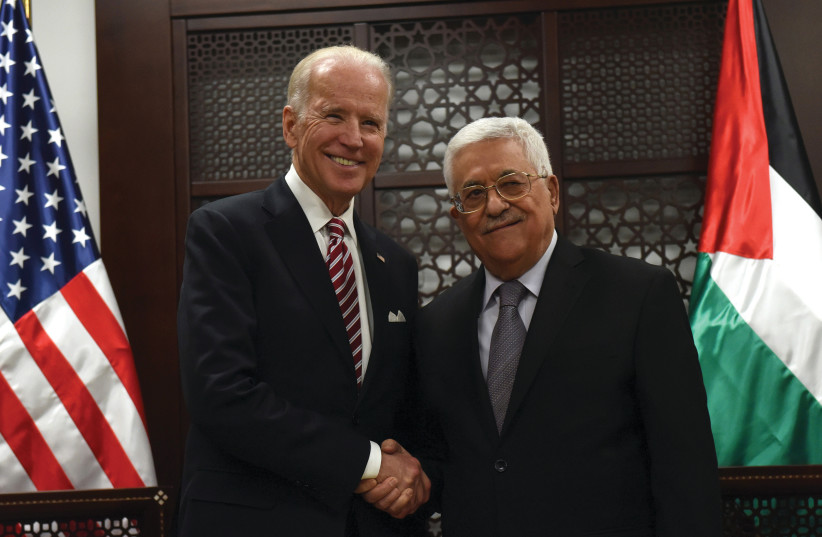Clifford D. May: Why Mahmoud Abbas Can't Make Peace with Israelis
Addressing the Revolutionary Council of Fatah last month, Palestinian Authority President Mahmoud Abbas asserted: "They say that Hitler killed the Jews for being Jews, and that Europe hated the Jews because they were Jews. Not true." Rather, Europeans "fought against these people because of their role in society, which had to do with usury, money dealings, and so on."Neutralizing Iran Comes before Normalization with Saudi Arabia
Abbas further claimed that David Ben-Gurion, Israel's first prime minister, "forced" Jews to flee Arab countries where they had lived for centuries to Israel "by means of pressure, coercion, and murder." As for European Jews, they "are not Semites," he said, citing the discredited theory that Ashkenazi Jews are descended not from ancient Israelites but from Khazars, a medieval Turkic kingdom.
In 1982, after a period of study in Moscow, Abbas was awarded a doctorate for a dissertation titled "The Relationship between Zionists and Nazis, 1933-1945." In it, he accused Zionists of aiding and abetting "the annihilation of the Jewish population in European countries occupied by Nazi Germany to implement the Zionist ideal of mass colonization of Palestine and create a Jewish state on its territory." He later published a paper casting doubt on whether gas chambers were used to exterminate Jews and claiming that the number of Jews murdered in the Holocaust might be "even less than a million."
If Abbas holds such views, no end to the conflict is possible so long as he is in office, no matter what concessions Israelis and others offer.
In a rather unusual speech, whose content was also disseminated by the Public Diplomacy Directorate in the Prime Minister's Office, the Head of the Mossad threatened that Israel would exact a price from the Iranians "deep in Iran, in the very heart of Tehran", for any damage to an Israeli citizen or Jewish individual or for the infiltration into Israel of Iranian weapon systems. Barnea explained that this price would be exacted from all the relevant echelons involved in such activity, whether carried out by Iran's own units or the various proxies operating on its behalf.
When referring to the threat posed by Iran's military nuclear capability, Barnea reiterated his former declaration: "We simply cannot allow Iran to have a nuclear weapon ever," and he added: "We are not just sitting idly by."
Despite the fact that the value of silence has been somewhat undermined in Israel recently, we need not suspect that the Head of the Mossad was speaking off the top of his head. His words were read from a written text and his speech was then widely disseminated.
Fewer words and more actions
Although in his speech he did evoke emotions of national honor and pride, which are in need of an urgent boost at this juncture, we should not necessarily assume that Barnea's words were aimed specifically at the ears of the Israeli public. Israeli sentiment tends to prefer actions, as they speak louder than words, and has reservations about the use of bombastic threats that is more characteristic of the style of rhetoric used by our enemies in Tehran, Beirut, or Gaza.
Even if this speech entails an implicit response to the criticism of the policy of containment in relation to Hezbollah's actions and those of additional adversaries – the public would still prefer that we speak the language of actions rather than words.
Neither are Barnea's threats necessary for Iran itself. Tehran is well and truly aware of its 'misdeeds', and their inherent risks and will clearly be able to make the connection between them and any Israeli response when such action is taken. Should there be any doubt about that, there are numerous ways of issuing hints after such action is taken, that will clearly underscore the connection between the subsequent Israeli operation and Iran's nefarious activity. As far as Israel is concerned, Washington should be the prime audience for the Mossad chief's words.
The US administration under President Biden, which has sought to lower the profile of the Iranian problem and to remove the danger of a military confrontation with it as far as possible, is now seeing the tangible results of its policy: a growing sense of confidence in Iran, leading to defiant activity on its nuclear program, providing aid to Russia in the form of supplying Moscow with drones for its combat effort in Ukraine, compounded by a significant increase in its efforts to promote acts of terrorism around the globe, owing to a feeling that it will not be required to pay any real price for all of this.












































